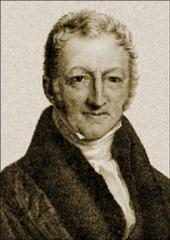Thomas Malthus said that man, sooner or later, universally, will run up against himself; that the population of mankind will eventually outstrip man's ability to supply himself with the necessities of life in his doctorine, "Essay on the Principle of Population". Thomas Malthus' doctrine states: "population increases in a geometric ratio, while the means of subsistence increases in an arithmetic ratio." In simpiar terms, the human race will face problems becuase of the decline in food supplies. Malthus developed his theory, at least to this extent: that left alone, no matter all the problems short of world wide catastrophe, humankind will survive, as, nature has a natural way to cut population levels: "crime, disease, war, and vice," being, the necessary checks on population." This proposition, as was made by Malthus in 1798, was to cause quite a public stir, then. Today most of the population do not necissarily fall under the Malthusian beliefs. What Malthus failed to take note all the future economic acticities that would further continue the food supply.
Thomas Robert Malthus was born in Guildford in 1766. He recieved his education until he enterd Jesus College, Cambridge. He graduated this college in 1788 as ninth Wrangler, taking Holy Orders in the same year. He was elected to a fellowship of his college in 1793, which he held until his marriage in 1804. In 1798, He origianlly published his doctrine, An Essay on the Principle of Population anonymously. Mainly in order to collect further material, he made extensive tours abroad in 1799 and 1802, and the results appeared in 1803 in a second edition. Later Malthus summarized his thesis in a short essay, A Summary View of the Principle of Population, published in 1830.
In 1805, Malthus was appointed to the faculty of the East India Company's newly-founded college at Haileybury, where he stayed until his death in 1834.
His honours included a Fellowship of the Royal Society, and membership of both the French Institute and Berlin Royal Academy. Among his other publications were An Enquiry into the Nature and Progress of Rent and Principles of Political Economy considered with a View to their Practical Application.
